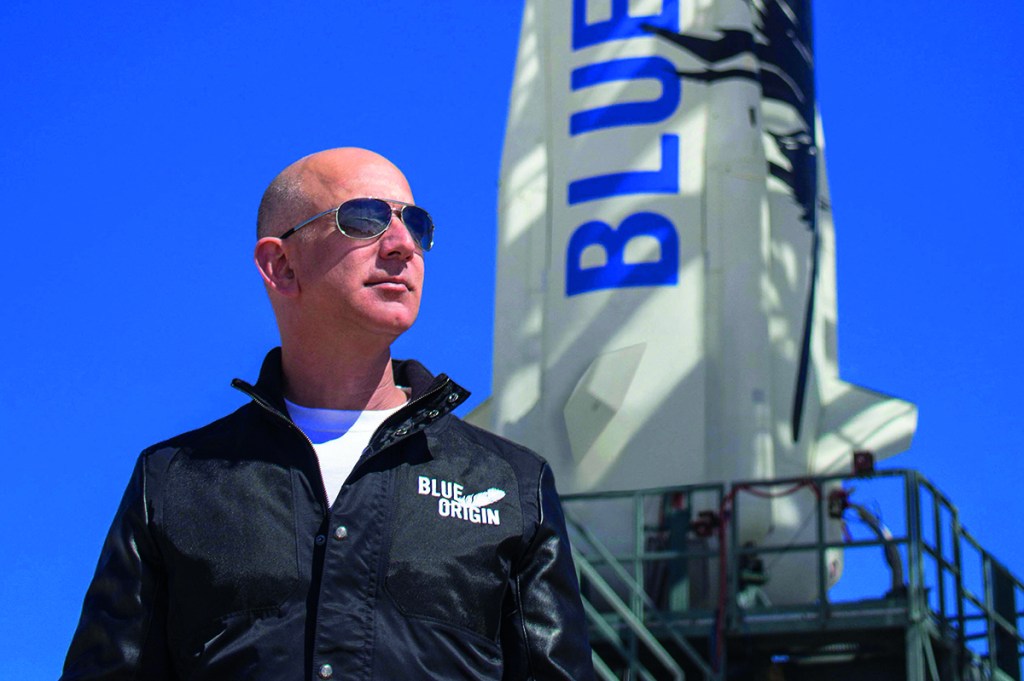Testosterone is having a moment. At once a molecular vector for toxic masculinity and a health-optimizing supplement for middle-aged tycoons eager to project vigor, “T” is perhaps the most discussed hormone around.
I blame Jeff Bezos, who has apparently aged in reverse since founding Amazon. After a tight-shirted appearance at the 2017 Sun Valley conference, his transformation from dweeby online-book-salesman to Vin Diesel-clone-with-alpha-swagger was unmistakable. Was he getting some hormonal help? Fast-forward a few years and he has acquired a hot Latina girlfriend and blasted himself into space in a giant metal penis. This left little room for doubt: surely he was marinated to a T, in T. Then, on New Year’s Eve, he posted that infamous poolside photo with said girlfriend, Lauren Sanchez, sporting heart-shaped shades, a garment that resembled a tattoo of a shirt rather than the real thing, and skinny white jeans. It was clear: at fifty-eight, Bezos is living his best midlife, and probably having some help doing it.
Testosterone replacement therapy is no longer solely the domain of elite bodybuilders or Hollywood actors getting jacked for a superhero role. There’s a burgeoning interest among the Silicon Valley set, obsessed as they are with biohacking and self-optimization: they’re bound to tackle the decline of testosterone that comes with age. After all, if they can hack and optimize impossibly complex computer systems, why not their own bodies?
The benefits of testosterone supplements, the argument says, go beyond physical considerations like bulging muscles. Sex drives are boosted; mental states improve, as do risk-tolerance and energy levels. Furthermore, hormone replacement therapy, delivered appropriately, has been shown to increase quality of life and protect from aging, lowering the risk of dementia, cardiac disease, metabolic syndrome and diabetes.
Dr. Jessie Cheung, a board-certified dermatologist whose Chicago-based practice focuses on cosmetics, sexual health and aging, has seen interest in hormone therapy surge since the pandemic as patients began to focus more on health and wellness over band-aid medicine. Through social media, many have become aware of “low T” and possible treatments, though what exactly is considered low is contested. Officially, the “normal” range for total testosterone is between 250-1200 nanograms per deciliter of blood (ng/dl) but given that T levels below 900 suggest an increased risk of dementia, Dr. Cheung says she prefers to think of it in terms of what is optimal instead.
And then there’s the behavioral aspect of testosterone, which can affect cooperation and fuel aggression in pursuit of status and resources. Many of the greatest feats in history were achieved by testosterone-driven men: Alexander the Great did the bulk of his conquering in his twenties. The recurring Silicon Valley myth of the college dropout who stakes everything on an idea and goes on to make billions is a less bloodthirsty form of the same thing. Such men and their high-risk initiatives change the world.
Testosterone obsessiveness has spread beyond the confines of Silicon Valley and its wealthy (and jacked) geeks. Panic has set in for the subset of the American population alarmed by the well-documented medical observation that since the 1980s, there’s been a substantial drop in testosterone levels, with precipitous declines averaging about 1 percent a year. Percentage-point drops start to add up: they mean that a sixty-year-old man in 2004 is likely to have a 17 percent lower testosterone level than a man the same age in 1987. No one knows exactly why, but the two most plausible explanations are our radical shift toward a sedentary, white-collar lifestyle and environmental factors such as the overuse of microplastics containing high levels of endocrine-disrupting chemicals.
There are two subsets of T-level worriers. Some are the Very Online, Joe Rogan-watching, fitness enthusiasts. The second set is made up of oddball neoclassical reactionaries of the political right, who can as easily reference Curtis Yarvin as they can Friedrich Nietzsche. What they both have in common is a strong adherence to a quote from a post-apocalyptic novel by G. Michael Hopf: “Hard times create strong men, strong men create good times, good times create weak men, and weak men create hard times.” It’s no surprise that the worriers believe civilization is currently at stage three of the cycle. Modern prosperity, they’re afraid, has brought about an ugliness and decadence that breed men who are weak in both flesh and spirit, men so comfortably immersed in the trappings of luxury that they have lost touch with reality and will accelerate civilizational collapse. The only way to disrupt or short-circuit the cyclical inevitability of going through hard times, they say, is to return as quickly as possible to essentialist norms of manhood.
With woke ideology capturing almost every institution, in every facet of Western life, it’s not hard to see the appeal of the argument. Insults first incubated in forums such as 4Chan and Reddit to belittle those liberal-minded men yoked to the excesses of feminism have long since spilled into mainstream social media. “Soy boy,” “beta male” and “cuck” became regular taunts alleging “low T,” the actual medical condition that has become a stand-in for views deemed insufficiently conservative.
America’s burgeoning interest in testosterone reached a mainstream apotheosis when Tucker Carlson released a Fox Nation documentary, The End of Men. Its homoerotic trailer went viral, with vignette after vignette of ripped, bare-chested men chopping wood, wrestling and firing machine guns, all set to the opening fanfare of 2001: A Space Odyssey, “Also Sprach Zarathustra” by Richard Strauss, which was inspired by the writings of, you guessed it, Nietzsche.
The string of cartoonish depictions of hypermasculinity culminated in a shot of a Vitruvian figure with a red light shining on his groin. This unforgettable segment introduced the world to “bromeopathy” as a concept and “testicular tanning” as a way to boost testosterone levels. It might not be crazy for Carlson to investigate the causes of, and possible solutions to, the intergenerational drop in testosterone levels, but common sense would dictate that under no circumstance should someone use low-level laser therapy on his scrotum. In fact, probably best to avoid bromeopathy — which is really just Goop for dudes — altogether. Carlson’s homoerotic log-chopping and testicle-tanning is happening amid a very real anxiety over gender roles and radical notions of what it means to be a man threatening to become de rigueur. Men, it turns out, have good reasons to believe that there is a “war” on them. Women tend to earn higher grades in school, and are dominating higher education, earning the majority of four-year college degrees. Meanwhile, men die from drug overdoses at a higher rate than women. And the very concept of masculinity itself is under assault, smeared as irredeemably toxic. While factions of the left castigate all men as knuckle-dragging reinforcers of masculinity and impediments to progress, factions on the right respond by doubling down on a version of masculinity that glamorizes brazen alpha manliness. The former vilifies and emasculates men; the latter ultimately disempowers them by permitting only the expression of a limited sort of hypermasculinity, in line with extreme stereotypes at the other end of the scale.
In this context, the popularity of the idea that testosterone is a magic bullet bearing the essence of manhood becomes more understandable. But it is finally a self-indulgent distraction. A vial of hormones or a beam of red light on your balls may give you strength and virility but it isn’t going to help you acquire the masculine virtues: a sense of responsibility, good character, impulse control, good sportsmanship, and protectiveness toward family. In other words, someone may look like a man, a manly hunk of a man, but is he really a man? How many musclemen have abandoned their kids or succumbed to drug or alcohol addiction? Society needs to abandon the idea that performative alpha masculinity is the answer to the inexorable march of feminization.
Yes, it’s true. Today’s man is not the man his father was, at least from the perspective of testosterone levels; as a society we’re still grappling with the physiological and social changes that might result from that. Testosterone may be part of the answer, but the rest must come from within. The way we get out of this cycle of nihilism is to create good men.
Good men create good times.
Good times create good men.
This article was originally published in The Spectator’s June 2022 World edition.


















